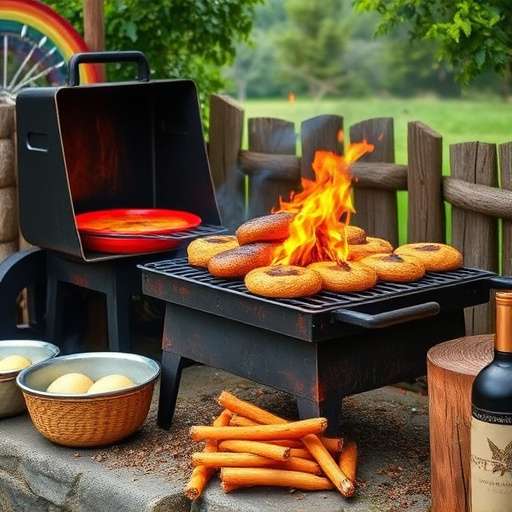Creating the perfect Recipe For BBQ Meatballs involves:
– Meat Blend: Balancing lean and fatty proteins like ground beef, pork shoulder, or brisket for juiciness.
– Sauce: Mixing ketchup, brown sugar, liquid smoke, apple cider vinegar, and olive oil for depth.
– Spices: Using a blend of salt, pepper, garlic powder, onion powder, liquid smoke, smoked paprika, cayenne pepper, and dried herbs.
– Shaping: Forming meatballs (1.5-2 inches) by hand for even cooking and sauce adhesion.
– Cooking: Pan frying or slow-roasting for tender, juicy results.
– Sides: Pairing with a crisp salad, grilled vegetables, garlic bread, or sauces.
– Storage: Refrigerate for 3-4 days or freeze for longer preservation, reheating to 165°F (74°C).
– Customization: Experimenting with meats, spices, sauces, nuts, dried fruits, and cheese for personalized flavor profiles.
Discover the secret to mouthwatering sweet and smoky meatballs that are perfect for any gathering. This comprehensive guide provides a recipe for BBQ meatballs that balances flavors with precision. Learn about choosing the right meat, crafting a harmonious sauce, seasoning techniques, optimal ball formation, and cooking methods for tender, juicy results. Additionally, explore pairing suggestions, storage tips, variations, and customization ideas to make your BBQ meatballs truly unforgettable.
- Choosing the Right Meat for BBQ Meatballs
- Creating a Balanced Sweet and Smoky Sauce
- Seasoning Techniques for Flavorful Meatballs
- Formation and Size of Meatballs for Best Results
- Cooking Methods to Achieve Tender, Juicy Meatballs
- Pairing Suggestions for BBQ Meatball Dishes
- Storage Tips for Leftover Meatballs
- Variations and Customization Ideas for Your Recipe
Choosing the Right Meat for BBQ Meatballs
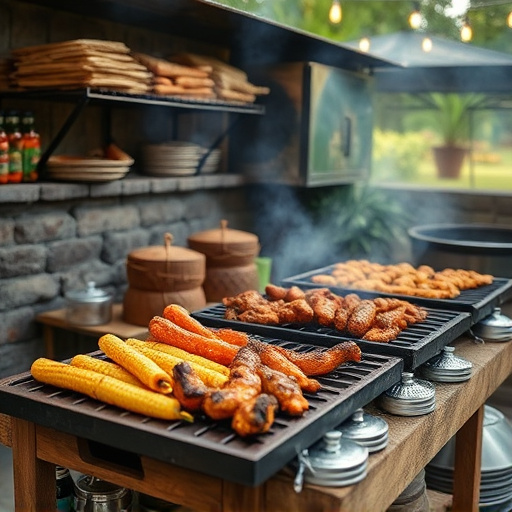
When crafting a recipe for BBQ meatballs, selecting the perfect meat blend is the foundation for delicious, smoky bites. Opt for a combination of lean and fatty meats to achieve both flavor and texture. Ground beef is a classic choice, but consider mixing it with pork shoulder or brisket for enhanced juiciness and a richer taste. This blend will result in succulent meatballs that hold together well on the grill.
For authentic BBQ flavors, choose cuts that offer a balance between tenderness and structure. Fatty meats contribute to a juicy, mouthwatering experience, while lean proteins ensure your meatballs don’t fall apart during cooking. Experimenting with different meat ratios allows you to create tailored meatballs that satisfy your taste preferences, making your homemade BBQ meals truly exceptional.
Creating a Balanced Sweet and Smoky Sauce

Creating a balanced sweet and smoky sauce is key to making your recipe for BBQ meatballs stand out. Start by combining a base of ketchup or tomato paste, which provides a rich red hue and a tangy kick. Next, add in a touch of brown sugar or molasses to enhance the sweetness—just enough to notice but not overpowering. For the smoky element, liquid smoke is your secret weapon; a few drops will impart a subtle, complex flavor that takes your meatballs from good to great. Adjust the sauce’s consistency with a splash of apple cider vinegar for tanginess and a drizzle of olive oil for richness. This versatile sauce can be served on its own as a dipping sauce or paired perfectly with grilled meats, vegetables, or even as a topping for burgers.
Seasoning Techniques for Flavorful Meatballs
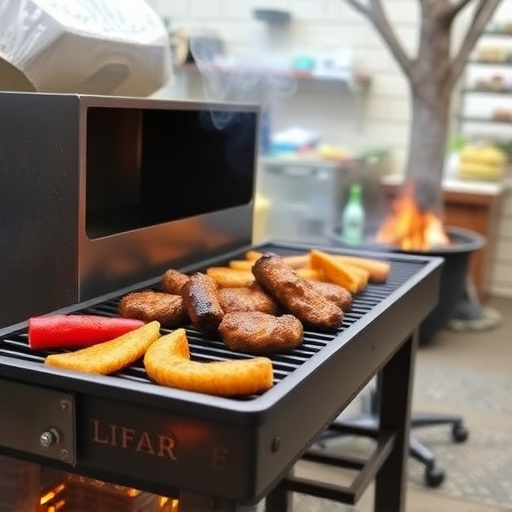
When crafting a recipe for BBQ meatballs, seasoning is key to unlocking a burst of flavor in every bite. The secret lies in balancing classic meatball spices with bold, smoky notes. Start with a foundation of salt and pepper, garlic powder, and onion powder, which add depth and warmth. Then, introduce liquid smoke or smoked paprika for that coveted smoky aroma without overwhelming the taste buds. A pinch of cayenne pepper can add a subtle kick, while dried herbs like rosemary or thyme lend a subtle earthy flavor.
Don’t be afraid to experiment with different combinations of these ingredients to create your ideal blend. To enhance the overall experience, consider marinating the meatballs in a mixture of BBQ sauce and olive oil before cooking; this not only keeps them juicy but also infuses them with extra sweetness and tang.
Formation and Size of Meatballs for Best Results

When crafting the perfect recipe for BBQ meatballs, the formation and size are key factors that can significantly impact the final dish’s flavor and texture. For best results, form the meatballs with your hands, ensuring they’re not too compact but have a nice density. The ideal size is about 1.5 to 2 inches in diameter; this allows for even cooking and ensures each bite is packed with rich, smoky taste.
A uniform shape helps the sauce adhere better, creating juicy, flavorful meatballs that hold together beautifully. Avoid making them too small, as they might cook faster on the outside while remaining raw inside. The balance between compactness and porosity is crucial; you want the meatballs to be able to hold their shape during cooking without being overly dense.
Cooking Methods to Achieve Tender, Juicy Meatballs
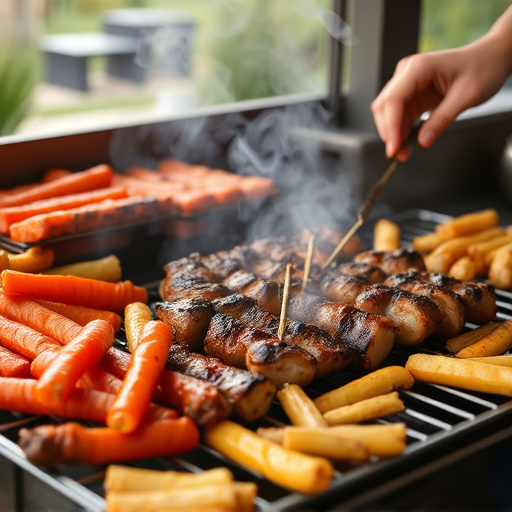
When crafting the perfect recipe for BBQ meatballs, the cooking method plays a pivotal role in achieving a tender, juicy result. Traditional methods like baking or boiling can leave your meatballs dry and tough, so opting for a sizzling pan fry or slow-roasting them in the oven is key. Pan frying allows for even heat distribution, sealing in juices and creating a delectable crust.
For a slow-roasted approach, consider cooking them low and slow in the oven. This method lets the meatballs cook evenly, ensuring they stay tender while developing a deep, smoky flavor from the natural caramelization process. Both techniques are simple yet effective, transforming your BBQ meatballs into flavorful bites that satisfy every time.
Pairing Suggestions for BBQ Meatball Dishes
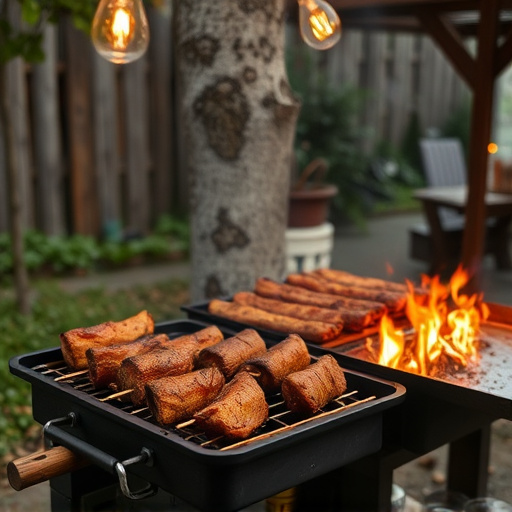
When crafting a dish that combines the sweet and smoky flavors of BBQ meatballs, there are several complementary pairings to consider for an unforgettable culinary experience. For starters, a crisp and refreshing side salad can cut through the richness of the meatballs, offering a balance of textures and tastes. Think a simple mix of greens, sliced cucumbers, cherry tomatoes, and a light vinaigrette dressing.
For those who prefer something more substantial, grilled corn on the cob or roasted vegetables like eggplant and bell peppers can add depth while preserving the central role of the BBQ meatballs. A side of garlic bread or toasted focaccia ensures every bite is accompanied by a soft, airy texture that contrasts nicely against the hearty meatballs. Don’t forget about sauces and dips; a tangy barbecue sauce or a creamy ranch dressing can elevate the dish even further in this recipe for BBQ meatballs.
Storage Tips for Leftover Meatballs

When it comes to storing leftover Recipe For BBQ Meatballs, there are a few simple steps to ensure they remain fresh and flavorful. First, allow the meatballs to cool completely before transferring them to an airtight container. This prevents bacterial growth. Store them in the refrigerator for up to 3-4 days. For longer storage, freeze the meatballs in individual portions; this can extend their shelf life by several months. When reheating, ensure they reach an internal temperature of at least 165°F (74°C) to kill any potential bacteria. Enjoy your delicious, smoky meatballs again, hassle-free!
Variations and Customization Ideas for Your Recipe
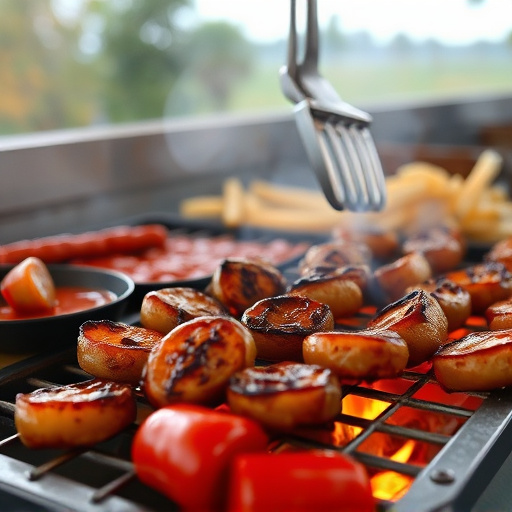
When crafting your recipe for BBQ meatballs, get creative with variations to suit every palate. You can experiment with different types of meat, such as beef, pork, or even a mix, to create unique flavors. Adding spices like paprika, garlic powder, and a touch of cayenne pepper will enhance the smoky taste, offering a range from mild to fiery hot. For a sweeter twist, incorporate ingredients like brown sugar, honey, or pureed fruit into your sauce, creating a delicious balance between sweet and savory.
Customization is key to making these meatballs your own. Consider adding nuts or dried fruits for a crunchy texture, or infusing herbs like rosemary or thyme for an aromatic appeal. BBQ sauce is not one-size-fits-all; feel free to choose your preferred brand or make your own, adjusting the sweetness and tanginess to your liking. Don’t be afraid to add cheese, either – grated Parmesan or cheddar can elevate these meatballs to a whole new level.
